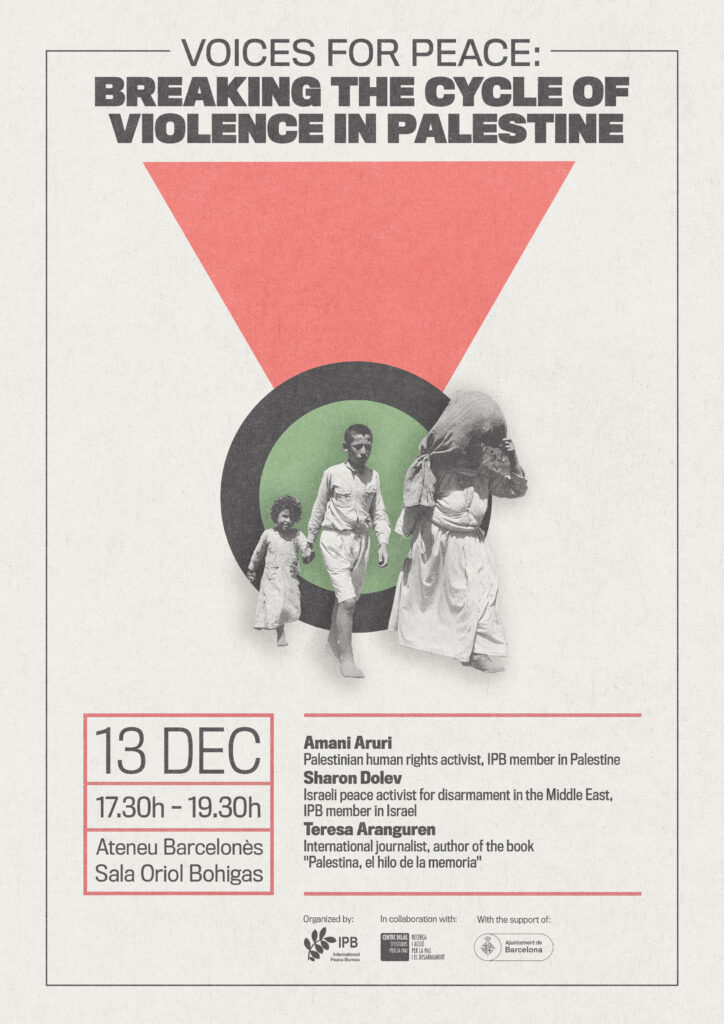IPB brings together experts and activists for an essential conversation: “Voices for Peace: Breaking the cycle of violence in Palestine”
On Wednesday December 13, 2023, the International Peace Bureau, in collaboration with Centre Delàs of Peace Studies, organized the conference “Voices for Peace: Breaking the cycle of violence in Palestine”. The event took place at Ateneu Barcelonés, downtown Barcelona, and aimed to analyze the recent escalation of violence in the region, and to explore from expert and activist perspectives possible ways of peaceful transformation of the violence.
The event opened with Sean Conner (Executive Director of the IPB), David Llistar (Director of Global Justice and International Cooperation of the Barcelona City Council) and Pere Ortega, Honorary President of Centre Delàs, welcoming participants to the conference.
After that, they gave room to the main round table of experts and activists, moderated by Chloé Meulewaeter, IPB Council member and Centre Delàs’ researcher. this panel brought together Amani Aruri, peace and human rights activist and IPB member in Palestine, Sharon Dolev, Israeli peace activist for disarmament in the Middle East and IPB member in Israel, Teresa Aranguren, journalist specialized in armed conflicts in the Middle East, and Emad Kiyaei, director of METO (Middle East Treaty Organization).
Knowing the past to understand the present and prepare for the peace of the future
The dialogue started with a first question focused on understanding the context in which the recent trigger for the escalation of violence on October 7 took place, asking the participants “what we need to know about the past to understand the present and prepare for the peace of the future”. Amani Aruri began by thanking the city of Barcelona for its unique and courageous stance towards the Palestinian cause, and the conference organizers for bringing together peace activists from Israel and Palestine in this dialogue. Aruri continued her intervention by focusing on the need to frame October 7 in its historical context, in order to understand the complexity of the situation, and gave several examples of situations of violence to which the Palestinian population, especially in Gaza, is subjected, in the context of the 75 years of occupation of Palestinian territories. Emad Kiyaei also mentioned the need to frame October 7 in the context of the occupation: “When you enter Gaza you see the level of hopelessness that this occupation has created. That hopelessness is the context through which we have to view what happened on October 7. Hopelessness and conflict combined offer us very narrow choices if you live in reality. And that is why some, in this case Hammas, resort to violence to resolve their conflict with Israel.” Teresa Aranguren also emphasized that violence occurs in a context of occupation and impunity of the state of Israel for several decades, questioning the term “Israeli-Palestinian conflict”, which can lead to understanding the situation from equidistance. Sharon Dolev ended the first round of questions recalling that violence also occurs in Israel, especially since the attack of October 7, stressing that in order to move towards peace it’s essential not to overlook what happened that day.
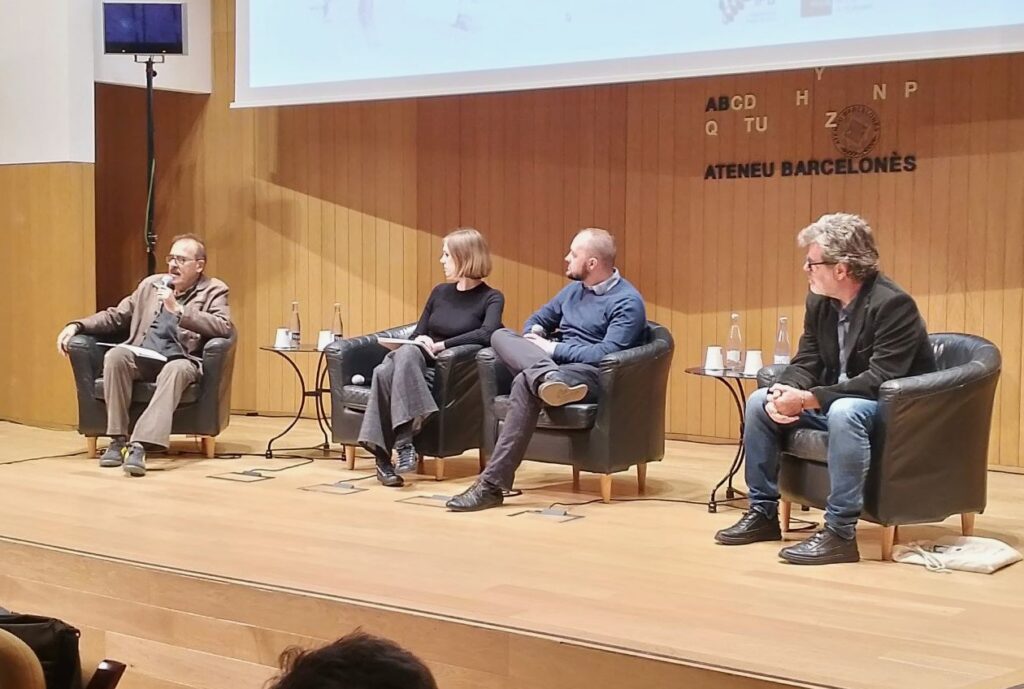
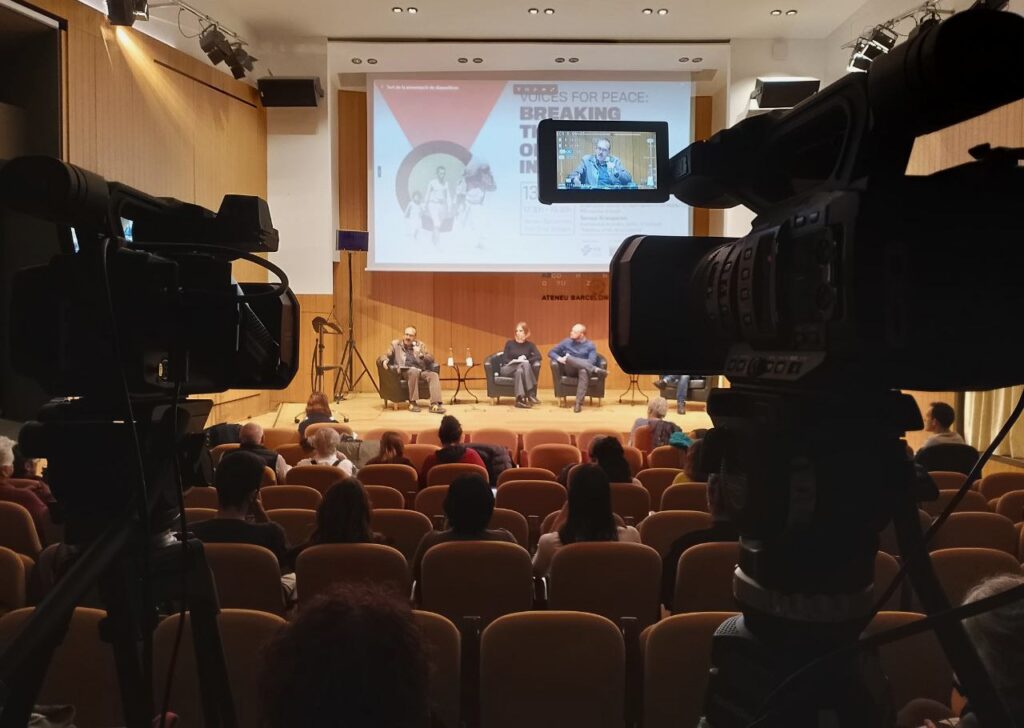
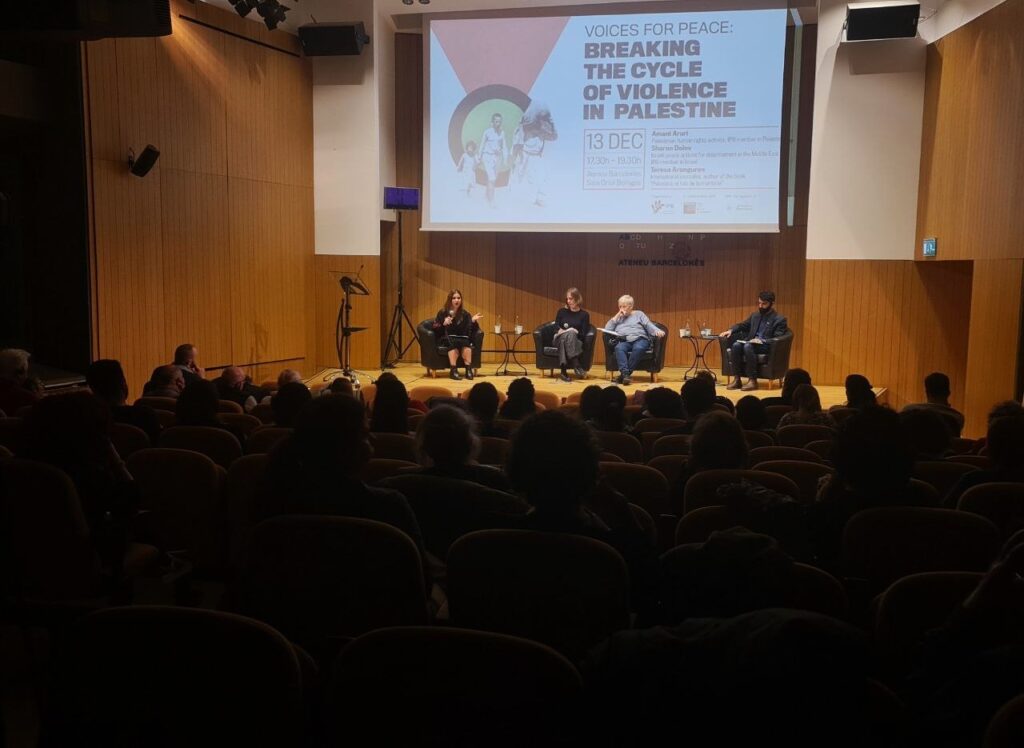
The motives behind the escalation of violence.
The second question of the roundtable asked the participants to share their thoughts on the intentions of the Israeli government after October 7. Emad Kiyaei emphasized that one must understand the aggressive reaction of the Israeli government from internal social pressure and the struggle for the government’s political survival. Teresa Aranguren went on to remind that the right to self-defense is enshrined in international law, but the right to retaliation is not. “Self-defense, according to international laws, is well defined. It doesn’t mean after, but the moment you are being attacked. It means: if you are attacked you have the right to defend yourself. […] When the right to self-defense is invoked because of the Hamas attack I think that right does not apply today for two reasons. First, Hamas is not attacking right now. This is retaliation. Second, we are talking about occupied territory, which is not the same thing.” In her turn to speak, Amani Aruri shared several personal experiences of violence and oppression she suffered to make visible the disproportion and asymmetry of power between Israel and the Palestinian, and how occupation affects the lives of Palestinian people. She also agreed with previous speakers upon the Israeli government seeking retaliation to improve its internal political image. Sharon Dolev concluded by noting that the disproportionality of the Israeli government’s reaction has nothing to do with the hostages, as it was the pressure from the people of Israel to release the prisoners that caused the government to start worrying about it.
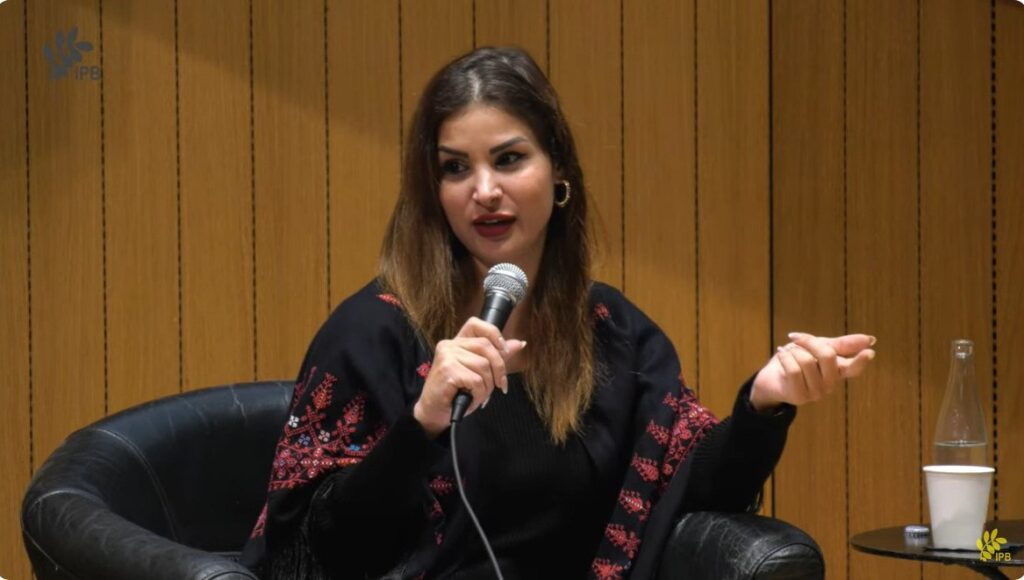
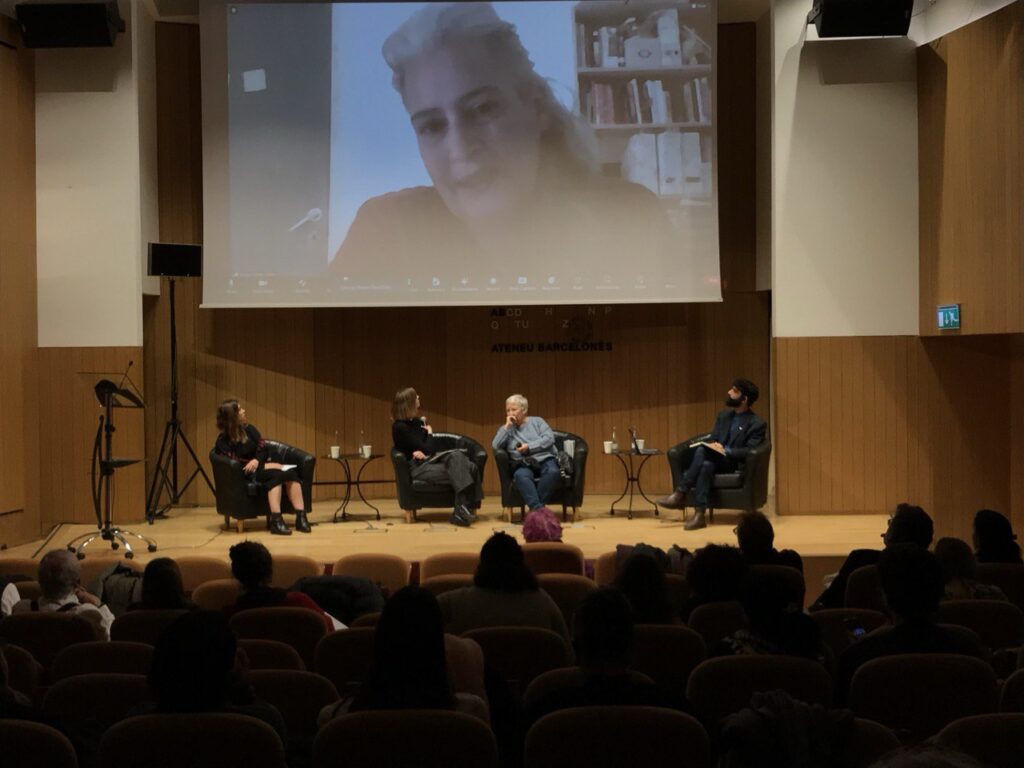
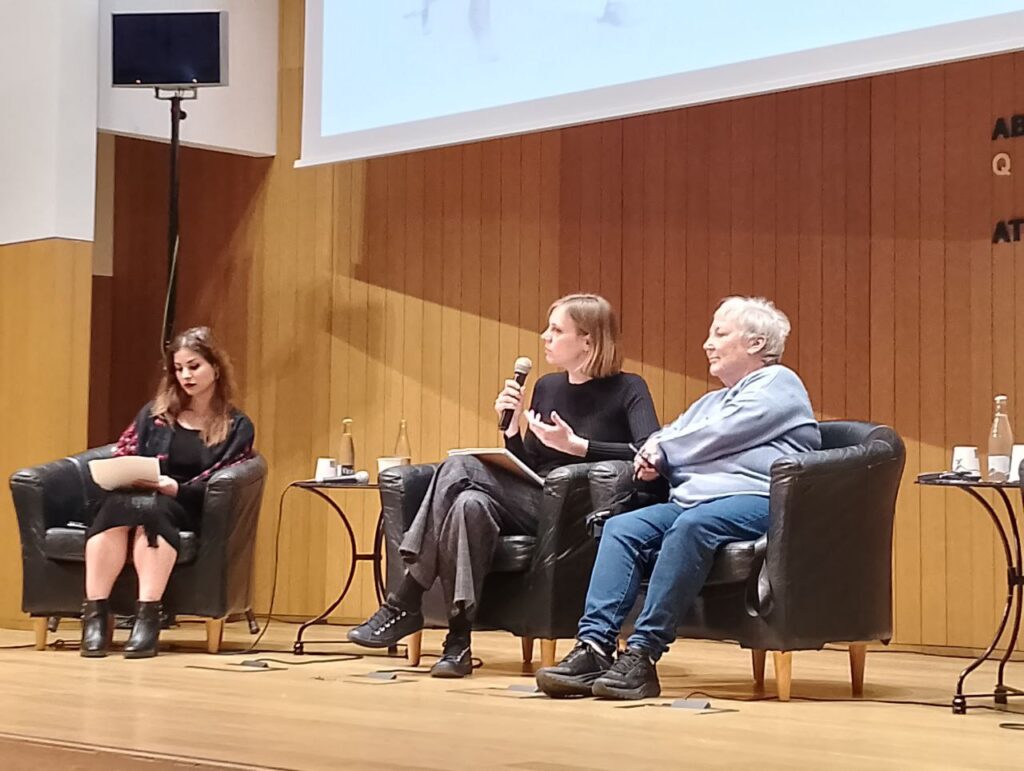
Seeking solutions to move towards peace building
In the last question for the panel, speakers were asked about possible peaceful solutions they could identify to move towards peace. Sharon Dolev said that “peace can only be achieved if people want peace. To want peace you have to imagine peace. There are good initiatives, like ours. From METO (Middle East Treaty Organization) we are looking towards regional solutions“. She also made a suggestion for the peace movement in Barcelona to try and see both sides and to be open to dialogue with the people of Israel. She stressed that in order to build peace we have to be able to see the other and understand their fears. To move towards a future of peace, Emad Kiyaei put three proposals on the table. First, to analyze the problem from the regional level in the Middle East. Second, from Barcelona and the Spanish state, to further mobilize civil society. Third, to build a regional integration organization in the Middle East. For Teresa Aranguren, the search for solutions begins with seeing the reality of the imbalance of power, the occupation and the impunity of Israel. She stressed that the responsibility to finding solutions rests with the international community, which must force respect for international law. Lastly, Amani Aruri ended the roundtable by calling for accountability and compliance with international laws, and called for people’s mobilization. Taking up Emad Kiyaei’s call for the development of empathy towards both sides, Amani Aruri replied: “Empathy and compassion, I totally agree with you. In fact, it is the main reason for popular solidarity. Without underestimating it, we need our actions to go further. We need our empathy to be translated into action in the streets. We need our governments, our people, to start speaking out.”
With this conference, the International Peace Bureau gives continuity to the World Peace Congress organized in Barcelona in October 2021: “(Re)imagine the world. Action for peace and justice” to further the dialogue on peaceful solutions to conflicts. The event was organized with the support of the Barcelona City Council.
The conference can be retrieved at the following link to IPB’s YouTube channel: https://www.youtube.com/watch?v=QwVRhKcA_0A

